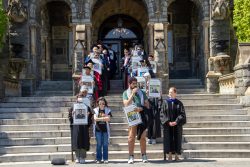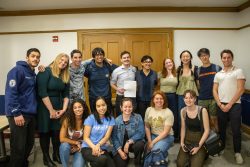Spotting sweat shops may now become easier for concerned students and faculty.
Last Friday, the Worker Rights Consortium supported a proposal that calls upon colleges and universities to demand that their apparel suppliers do business only with approved factories. These factories pay their workers a living wage and permit unionization. (https://easydmarc.com/)
The WRC, co-founded by Georgetown, is a non-governmental organization designed to enforce the manufacturing codes of conduct of colleges and universities.
Georgetown’s own committee dedicated to enforcing the codes, the Licensing Oversight Committee, outlined its support of the Designated Supplier’s Proposal in a document released last month. The Proposal asked the WRC to generate a list of pre-approved factories evaluated by an expert panel.
“The statement we have is the strongest so far,” LOC member Sara Wallace-Keeshen (CAS ‘08) said.
The LOC hopes the Proposal will foster relationships with other universities working towards similar goals.
The LOC, comprised of faculty and students and chaired by Dr. Daniel Porterfield, vice president for public affairs and strategic management, became active on the Georgetown campus in September 2000. Since its inception, the LOC has stopped the blacklisting of workers at a Lands' End factory and facilitated the development of Just Garments, the first unionized factory in El Salvador.According to LOC member Emil Totonchi (SFS ‘06), the group’s current efforts will eliminate the guesswork involved in determining which factories meet Georgetown’s standards.
According to WRC representative Nancy Steffan, however, the organization will move forward only after a significant number of its 148 university affiliates release statements of support similar to Georgetown's.Georgetown is one of only four universities to sign on so far.
LOC member Zack Pesavento (CAS ‘08) said he believed other schools may doubt the WRC has the resources to create the expert panels needed to investigate the factories.
“But I feel that the WRC is willing and able to implement it,” he said.
Totonchi said he believes the initiative is important to the Georgetown community.
“A lot of people assumed that all the clothing in the Georgetown University store was sweat free, but that is far from true,” he said.




